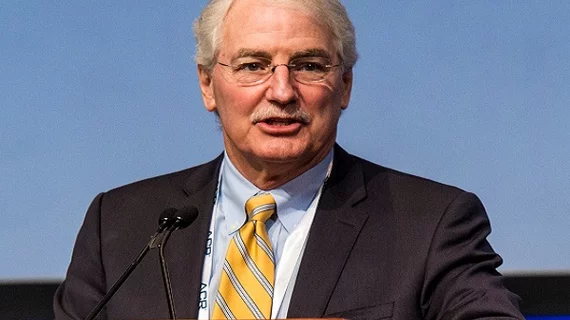ACR ‘alarmed’ by number of small practices included in CMS’ new mandatory payment model
The American College of Radiology is expressing deep concern over a mandatory new CMS payment model set to take effect in less than three months.
ACR chief William Thorwarth Jr., MD, voiced his unease about the radiation oncology bundled payment initiative in a recent letter to federal leaders. In particular, the college wants CMS to delay the Jan. 1 start date for the program, since the feds only granted providers 3.5 months to prepare amid a public health crisis.
Thorwarth also believes that forcing 30% of radiation oncology episodes into this new payment model goes too far, and he is worried about the potential impact on physicians who are already struggling to survive.
“The ACR is alarmed that such a significant number of small and rural practices are included in the model, while many large metropolitan areas have been spared, and are expected to use their limited resources to adopt and implement certified EHR technology, among all of the other reporting requirements for participation,” he wrote Oct. 2 to Administrator Seema Verma and others.
The Centers for Medicare and Medicaid Services first finalized the long-awaited RO model on Sept. 18. Its goal is to create more predictable payments in cancer care, incentivize the use of cost-effective treatments, and save the agency $230 million over the next five years. The model will do so by providing bundled payments during a 90-day episode of care to radiotherapy providers treating one of 16 different cancer types. It will require participation from physicians in randomly selected geographic areas that contain about 30% of all eligible Medicare fee-for-service radiotherapy episodes nationally.
Provider groups including the American Society for Radiation Oncology have been quick to condemn CMS’ efforts as going too far. ASTRO expressed its own worries to CMS Oct. 2 in separate letter cosigned by ACR, the American Medical Association and others. They want the model delayed until at least July 1 and, ideally, Jan. 1, 2022, and to limit any discount factor reductions to no more than 3%. Currently, the RO model calls for cuts of 3.75% and 4.75% to professional and technical payments, respectively.
“Risking the viability and putting unnecessary stress on radiation treatment clinics and staff is unacceptable at any time and especially now,” ASTRO and others wrote. “Radiation oncology needs immediate clarity before being forced to rush headlong toward the Jan. 1 deadline.”

